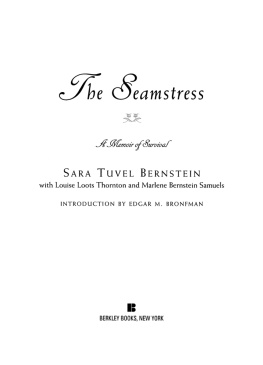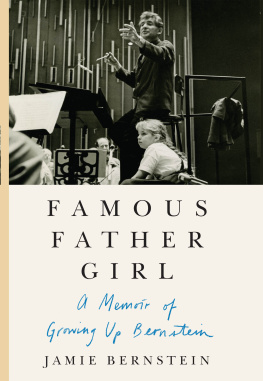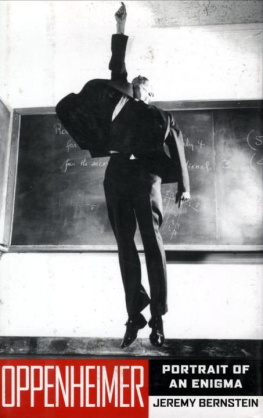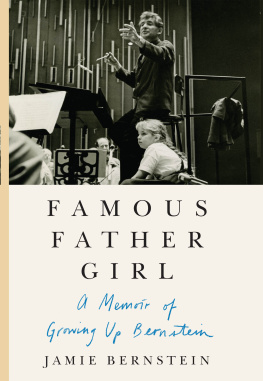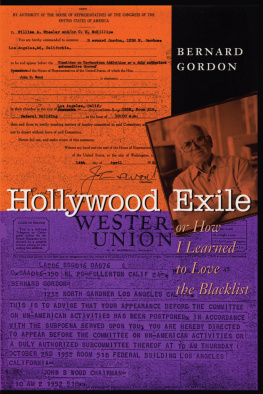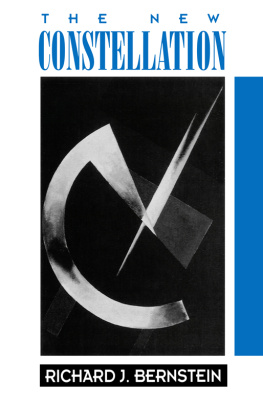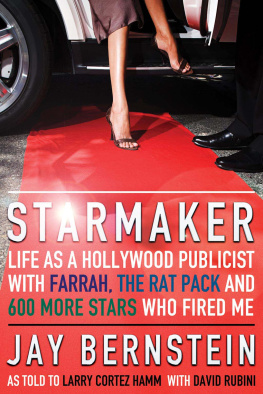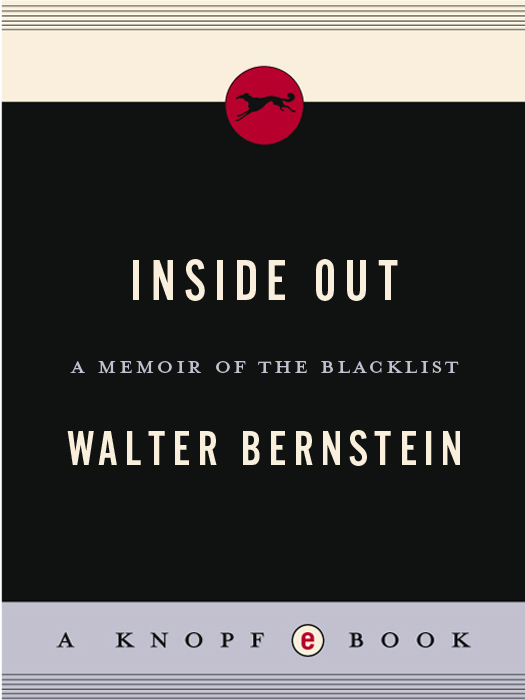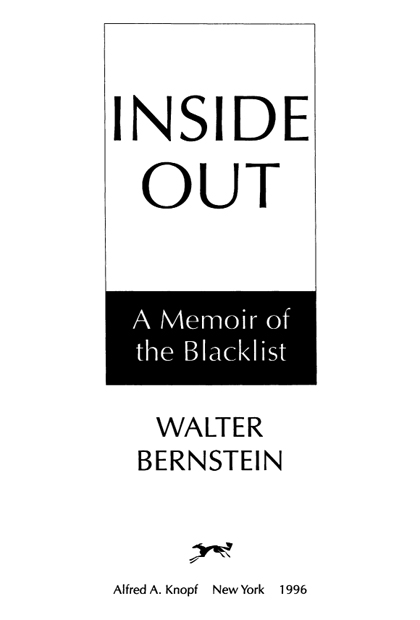Also by WALTER BERNSTEIN
Keep Your Head Down
THIS IS A BORZOI BOOK
PUBLISHED BY ALFRED A. KNOPF, INC.
Copyright 1996 by Walter Bernstein
All rights reserved under International and Pan-American Copyright Conventions. Published in the United States by Alfred A. Knopf, Inc., New York, and simultaneously in Canada by Random House of Canada Limited, Toronto.
Distributed by Random House, Inc., New York.
http://www.randomhouse.com/
Library of Congress Cataloging-in-Publication Data
Bernstein, Walter.
Inside out: a memoir of the blacklist / by Walter Bernstein.
p. cm.
eISBN: 978-0-8041-5048-4
1. Bernstein, Walter. 2. ScreenwritersUnited StatesBiography. 3. Blacklisting of authorsCaliforniaLos Angeles. I. Title.
PN 1998.3. B 477 A 3 1996
812.54dc20
[B] 96-12569
v3.1
For my children
and
For Gloria
Contents
T he blacklist returns in images.
A man is beating his wife.
The year is 1950 and I am watching them from the window of my living room. It is a hot, sticky New York day and I wear only underwear shorts. The phone is ringing, but I am held by this scene across a courtyard from my apartment. No one else seems to be paying any attention, although both lovebirds are screaming. When he starts dragging her across the room by the hair, I decide to call the police. But then, head yanked back, she spots me through her window. The sight infuriates her. She yells up at me, outraged, Put on your clothes, you! I duck away and answer the phone. It is my agent. He wants me to use a pseudonym for a script I have written for television. Until now I have always written under my own name. But he says the climate is changing. He talks vaguely of certain lists. I am known to be left-wing, why take a chance? I agree, needing the work. I hang up and hurry back to the window, peering around a corner. The couple sit lovingly at a table, sharing a beer. I feel betrayed, ashamed, disappointed, guilty. Tragedy has turned to farce.
It would be like that for the next nine years, for me at least, trying to survive as somebody else.
I am walking down a street when I see a man approaching. He is a producer I have worked for in the past, a pleasant man with a lovely wife and two lovely children. He has good taste in all things, rare in a producer, or anyone else for that matter. He is sorry he cannot hire me now, even under a pseudonym or with the protection of a front. His regret is genuine; he hates the blacklist. But now he sees me and ducks his head and crosses the street so we wont meet. His face is set in a rigid half smile. He is angry at me for subjecting him to this.
I am standing on a subway platform when two men approach me. They are dressed conservatively and wear felt hats. They introduce themselves politely; they are from the FBI. They ask if I am now ready to talk to them. It is not the first time the FBI has confronted me with this question, but before they have always come to my home. The fact that they have found me far from my house is unsettling. I know it is done to unsettle me, but this does little to mitigate the fear. I may be followed. My phone is being tapped. Someone is telling them where I go. I shake my head and move away. They do not follow but watch as my train arrives and I get in. Through the closing doors I see them standing there, expressionless, watching me.
The images dissolve, one into the other. None has pride of place. I write movies; focus is all.
I BEGAN writing movies in the summer of 1947, when I went to Hollywood to work at Columbia Pictures for a writer-director-producer named Robert Rossen. At the time, I was on staff at The New Yorker, where I had published fiction before the war and reportage later as a soldier in the army and now as a civilian. The war material had been published as a book and received well enough so that I got a ten-week Hollywood contract. I was delighted to go. The best part of my childhood had been lived either on the street, playing ball, or in the movies. That was my real life; the fantasy life was what went on at home. So I flew off with a light, expectant heart, sitting on the plane next to an anxious young actor named Robert Stack. He, too, was a recently returned veteran and doubtful whether he still had a career. Before the war his distinction had been that he was the boy who had given Deanna Durbin her first screen kiss. He was worried now that everyone had forgotten him. I assured him that he would be remembered, and indeed he was. But he spent the flight morosely fearing the worst, while I looked happily out the window at the welcoming country rolling underneath.
Hollywood turned out to be all I had hoped for. The sun shone brightly and the air was soft. You could see mountains. There was no smell to the flowers, but I had had enough smells in New York. The first morning an actor friend drove me to catch a bus to the studio. The only other passenger was a very pretty young woman. She recognized my friend from a movie he had just made and asked if I, too, was an actor. I said I was a writer. She asked if I was working. I said I was under contract to Columbia. She stood up and came over and sat down beside me. She said she was an actress and she had a boyfriend, but he was home in Oregon and she liked writers because they were intelligent. She gave me her phone number. Nothing like that had ever happened to me before. But when I called, either her boyfriend had returned or it was another working writer who answered with some irritation. So that was the end of that, although it seemed a promising start.
For Rossen, I was to write a screenplay based on a Chekhov story called The Grasshopper, but he soon switched me to a more ambitious project Columbia had given him, an adaptation of the Robert Penn Warren novel All the Kings Men. I did not write very much. Mainly I sat listening to Rossen as he paced the room, punching the air with his fists. He was a chunky, aggressive New Yorker who had served thirteen years as a contract writer at Warner Bros. In those days, as he told it, two or three writers would be assigned to a staff producer and they would meet every morning to go over the days newspapers and see what true stories could be turned into movie fiction. They were often gangster stories. The big stars had all been taken by MGM, so Warners had to develop stars out of plots rather than the other way around. They managed to create Cagney and Bogart and Davis and Robinson and Garfield and Flynn and even Paul Muni, the eminent actor from the Yiddish and Broadway stage, whom they billed as Mr. Paul Muni to show they were stepping up in class. They also developed a style of fast, tough, cynical romanticism that became a Warners trademark. This was Rossens specialty and he eventually got his chance to direct a melodrama called Johnny OClock, although for Columbia rather than Warners. This led to directing Body and Soul with John Garfield, a successful independent movie that led in turn to his present triple-threat capacity at Columbia.
I learned a good deal about movies from Rossen, especially about how they moved. He knew the kinetic nature of the art, the fluidity and combination of images that drove a story. And drive was what interested Rossen; he came from the school of bang-bang storytelling where what counted was what happened next and the sooner the better. He acknowledged the primacy of content, but his heart was in the action. What he mainly wanted from me was someone who would help him make his political ideas palatable to the studio executives. Like myself, Rossen was a Communist. This was no secret to anyone. Once he wanted to move his desk to a more pleasing spot and the two of us began wrestling it around his office. Suddenly an irascible voice called out from the doorway.


